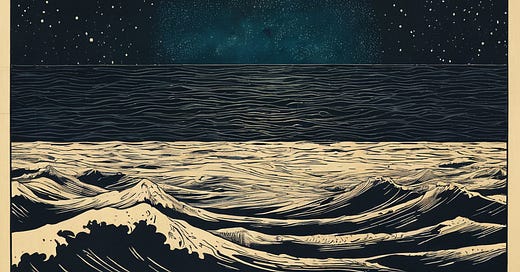On a dusty shelf of some old store, a Baedeker, left in our universe by a traveler from another, waits to be discovered by that most patient and intrepid of explorers: the reader.
The night ship Desod appeared from the æther as an absence over the still surface of the Gasfan Sea. A pinprick canopy of stars, faithfully reflected in the water, filled the clear night sky and camouflaged the approaching ship until at last it moved across a nebula near the horizon. Briefly, the distant glowing gas revealed in relief a falling silhouette that merged with its rising reflection before breaking the surface. Its black keel split the water and stars churned in reflection, as if the vessel’s arrival had disturbed the very universe.
Watching from the docks, seven members of the Pax Regarda stood uncomfortably in their heavy robes as the black-hulled Desod silently approached. Their immobile gazes, hidden by heavy, pointed cowls on which a single open eye was stitched, never strayed from the hold, even as the ship’s three large booms passed overhead, sliding dangerously close to the buildings near the shore.
When the Desod finally settled as a black wall before them, silent and still, the stevedores and longshoremen—some animal, some mineral, some machine—came forward to open the lok-latches and hold fast the mooring cables, and the heavy ship was fixed with a loud clang that echoed faintly off the walls of the neighboring city. Long poles were raised and special hooks opened hatches that fell as gangplanks to the dock, where passengers and crew assembled to gather their belongings. None of them wandered within ten lagats of the Regarda, whose presence, along with the late hour, suggested to all present that the ship carried a precious cargo.
In fact, it carried three. The first was a High Mendicant, a robotic saint of the Sibelline Order that had been meditating for four hundred and fifty-three years, during which time it had not once moved or spoken. It simply sat cross-legged, horns still, six hands open in perfect, immovable repose such that it was only by faith that the machine’s Atishan attendants knew it still functioned at all and was not a gilded mantelpiece. They carried it by means of a large divan whose tasseled roof swayed mightily as it was hauled over the hatchway and down to port. But the Mendicant remained still as a statue, even as it nearly fell into the water. Its attendants reached with panicked shouts and held it fast as the divan was righted from a precarious tilt. When at last the motionless machine reached the cobblestones safely, the monks bowed and made penitent gestures before lighting candles and carrying it in holy procession to the Birzkirk, where the Mendicant was to be enshrined for the next century on the hopes that the honor of receiving its awakening would fall while under their care.
The second cargo was the egg of a giant corcoran, which would, if incubated correctly, hatch in 19 years. All seven members of the Regarda lifted their pointed cowls as a large boom turned in the air overhead, reached into the black ship’s hold, and removed a speckled mass as large as a house. Because corcoran birds were massive, flightless, and distasteful, their only practical purpose was the laying of eggs for sale to investors, who bred the birds in the hopes of producing ever larger eggs. The ocean-green specimen removed from the Desod contained a female, which meant it was far too expensive to be the property of any one individual and belonged instead to a consortium of interests formed for the very purpose of buying it, including a wealthy Incomium dye magnate, the machine-worker’s union, the local Rookrip, and—if the rumors were true—one of the surviving members of the Tarquin family. Felt straps hugged the speckled shell as it moved over the water and was lowered onto a steel-sided conveyance, where it was locked behind four inches of cold-pressed metal. A whip cracked and a train of long-haired bushieks, each at least seven lagats from nose to tail, pulled the wheeled fortress away with the clatter of iron hooves.
Silence fell as the last of the ship’s tired occupants wandered into the night in search of sleep or companionship. Somewhere in the nearby sailor’s quarter, a gaggle of drunks sang sea shanties and lied.
And still the Regarda waited.
After the last batch of prisoners were pulled away in chains, and the ship’s Cyclopean captain wandered down the causeway, yawning and rubbing his eye, a heavy door shuddered shut, lights and lanterns were extinguished, and a deep stillness fell that heralded the approach of dawn. Alone in the darkness, the seven cowled figures finally stirred. One whispered to the others in a guttural language only they knew. The last of the three rare cargoes was nowhere to be seen. Had they missed it? It was impossible to say. For none of them had seen a Mysterian before. It wasn’t even known how big they were, or whether they walked on two legs or four.
When the muezzin finally called from her tower and the sky began to lighten in the south, the Pax Regarda retreated in a rare defeat. In their wake, they left only the lapping water, the gargantuan night ship, and a flitting shadow on the cobblestones.
The Summoning of Ecstasy
On a dusty shelf of some old store, a Baedeker, left in our universe by a traveler from another, waits to be discovered by that most patient and intrepid of explorers: the reader.






